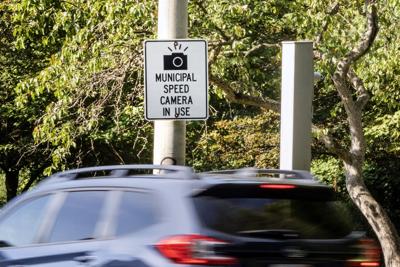ÎÚÑ»´«Ã½’s speed camera program will be up for debate again at city council next week, when staff present a report about limiting tickets for first-time offenders.
Meanwhile, some members intend to push for a review of the appeals process for the tickets, which they say has been plagued with technical problems.
The is in response to a motion Mayor Olivia Chow moved at the end of a fractious debate at council last month, which was sparked by Coun. Anthony Perruzza (Ward 7, Humber River—Black Creek) floating the idea of suspending the automated speed enforcement (ASE) program. Perruzza decried the cameras as “speed traps” but ultimately backed away from his own idea, although not before a couple of hours of messy back-and-forth in the chamber.
In a speech to council June 26, the mayor stressed how dangerous speeding can be, but argued that for the cameras to be effective, drivers need to be made aware of them. She asked staff to look into installing more visible signage — a move Premier Doug Ford has been vocal about — and also suggested that car owners should be given a grace period that would prevent them from racking up multiple tickets before the first one arrives in the mail.
“Some people, they didn’t know they got a ticket (because) they haven’t received one. So they drive through that same area (and) ... get a ticket over and over again,” Chow said. She suggested it would be fair not to ticket drivers multiple times until they get the “shock” of the first one arriving in the mail, after which “they probably will slow down.”
The report going to next week’s council meeting, which begins Wednesday, didn’t make any recommendations to council. But the document co-signed by general manager of transportation Barbara Gray and city solicitor Wendy Walberg determined that while it would be possible to limit the number of tickets drivers get from a given camera before their first notice, doing so would present “considerable risks to the safety of ÎÚÑ»´«Ã½nians.” It would also compromise “the integrity” of the ASE program, which staff said has been successful.
A recent evaluation conducted by the Hospital for Sick Children found the ASE program has resulted in a 45 per cent reduction in the number of drivers speeding, according to the report.Ìý
The report noted that the cameras are only permitted in school and community safety zones, and limiting the number of tickets given out in these areas would enable “dangerous speeding to continue” around vulnerable road users.
Staff estimated that the cost to implement the change would be about $36,000 in system updates and $520,000 in foregone revenue, and that it would benefit only a small number of vehicle owners. In the first month of all 150 of ÎÚÑ»´«Ã½’s cameras being in operation, there were a total of 94,243 infractions issued. About 5,800, or six per cent, were to repeat offenders.Ìý
A spokesperson for Chow didn’t say Friday whether she wants to move ahead with a grace period for repeat offenders, but said she was reviewing the report.
“The mayor also wants to explore ways to notify drivers sooner, since people might not drive slower if they are unaware of their speeding infraction until the ticket arrives a week or so later,” said Shirven Rezvany in an email.Ìý
Perruzza said he disagrees with the conclusions in the staff report. He argued that most drivers are law-abiding, but the city doesn’t do a good job informing them about the locations of cameras or when speed limits are lowered.ÌýHe said the problem could be addressed through better signage or a warning letter before a fine is issued.Ìý
”Most drivers want to follow the rules but don’t know ·É³ó²¹³ÙÌýthe rules are because they’re not readily available,” he asserted.
The city launched the ASE program in January 2020 as part of its Vision Zero road safety plan under former mayor John Tory. It started with 50 cameras, and earlier this year was expanded to 150.
Despite evidence of the cameras’ effectiveness, they have faced a wave of pushback in ÎÚÑ»´«Ã½ and beyond. Last month, Vaughan paused its program after cameras at 10 locations resulted in more than 32,000 tickets in three weeks. In ÎÚÑ»´«Ã½, the devices have been hit by a rash of vandalism that has resulted in the most high-profile one, at Parkside Drive, being repeatedly cut down.Ìý
Coun. James Pasternak (Ward 6, York Centre) generally supports the program, but says the ticket appeals process needs to be improved. In January the city moved ASE appeals to its online administrative penalty system, which was supposed to reduce the burden on overworked courts. Before the change, appeals were argued before a justice of the peace.Ìý
Pasternak has to next week’s council agenda, seconded by Perruzza, asking for a review of the appeals system “to ensure the process is straightforward, fair and simple to navigate.” He said residents have complained about problems such as the city website not recognizing their ticket number, or tickets being sent to outdated email addresses, which “undermines the legitimacy of the entire program.”






























To join the conversation set a first and last name in your user profile.
Sign in or register for free to join the Conversation